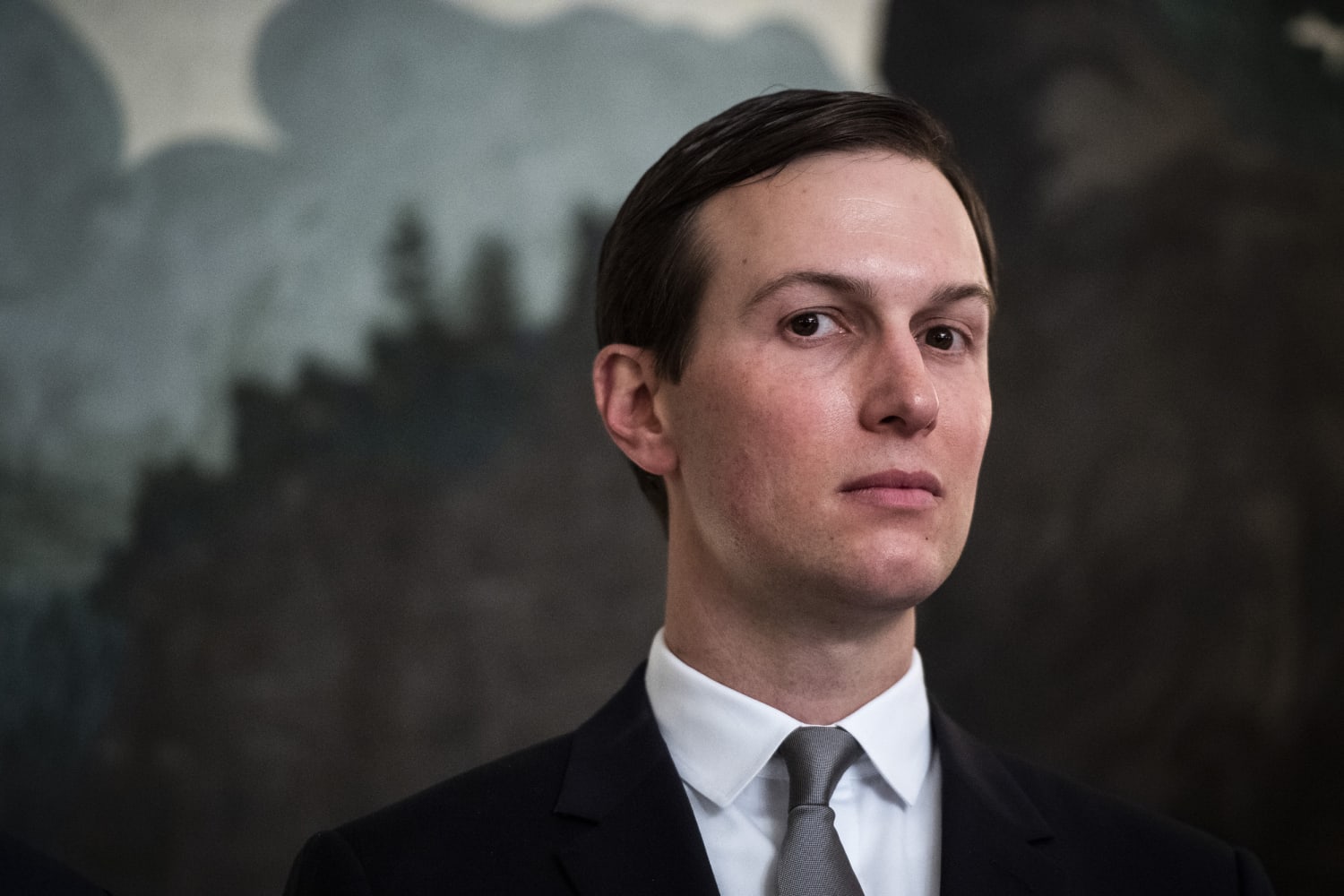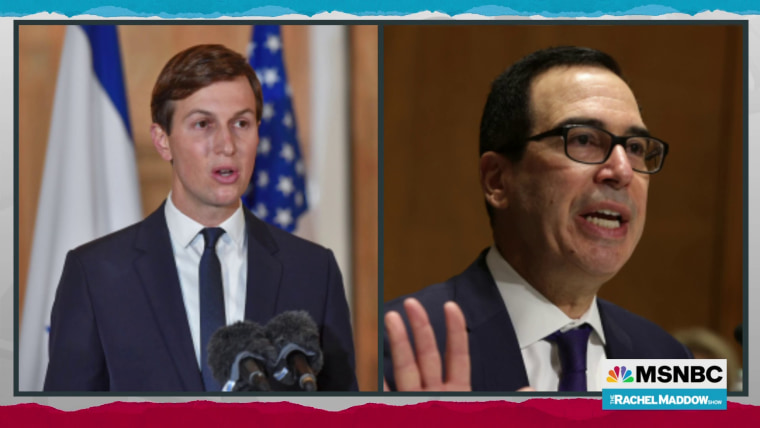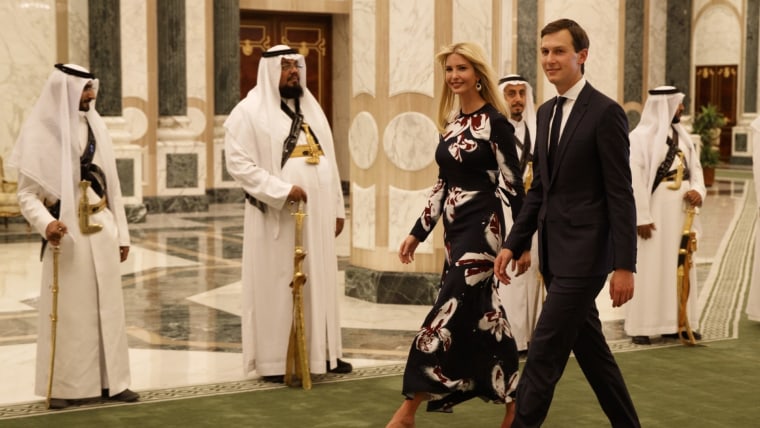Since leaving the Trump White House, Jared Kushner and his wife, Ivanka Trump, have abandoned their pre-Washington lives as socialites in Manhattan and are seeking to live in comparative isolation in Indian Creek, an island in Miami-Dade County known as “Billionaire Bunker.” Kushner’s somewhat brief period of solitude ended on Tuesday, however, with the release of a new book humbly titled “Breaking History.”
Kushner’s somewhat brief period of solitude ended on Tuesday, however, with the release of a new book humbly titled “Breaking History.”
It’s been reported that the couple’s Northeast decampment is partly because they doubt the reception they’d get — at least publicly — from many of their old New York friends. Key figures in Trump’s administration, their efforts to always appear “the good guys” have often backfired. Kushner’s polished veneer started to wear especially thin in the context of his freewheeling approach to foreign policy and much else.
(Take for example my own reporting that he may have endorsed or at the very least failed to prevent a 2017 blockade of Qatar, home to the U.S. air-base Al-Udeid. That blockade raised questions as it occurred soon after Qatari investors reportedly rebuffed his father on a key real estate deal. Nine or so months later, that deal would be saved by Brookfield, a Canadian real estate investment trust whose largest outside shareholders are the Qatari government.)
So why would Kushner, who says repeatedly in his new memoir that he prefers to be in the background, want to write an autobiography in the first place?
As his words make clear, again and again, Kushner actually loves the limelight, the awards, the pats on the back — from world leaders and from himself. He is his own best hype man, with eternal confidence in his abilities as a negotiator extraordinaire, a disruptor who achieved peace in the Middle East where more boring, traditional mindsets failed.
The point of this book, I realized as I struggled through to the end of its 500-plus pages, is classic historical revisionism. Kushner is trying to cement his personal legacy as he sees it: An individual following in the footsteps of Churchill and Roosevelt; a figure who quietly re-shaped world history in the shadows of his more flamboyant (and, in his mind, brilliant) father-in-law.
We, the media who covered the Trump administration, knew that Kushner “got” Trump, which gave him an advantage. But, according to the book, Trump also really “gets” Kushner, even when everyone else around them doesn’t. “Jared’s a genius,” said Trump, according to Kushner. “People complain about nepotism — I’m the one who got the steal here.”
The biggest problem (although there are many) with Kushner’s book is the way it glosses over the subtext that came to define and complicate Kushner’s wide-ranging White House portfolio.
The biggest problem (although there are many) with Kushner’s book — whether by omission, contradiction, or a self-serving recasting — is the way it glosses over the subtext that came to define and complicate Kushner’s wide-ranging White House portfolio: money.
Were Kushner’s transactions abroad and domestically made in the interest of America or in the interest of Kushner himself? Congress has asked for all of Kushner’s correspondence with Saudi Crown Prince Mohammed Bin Salman in the wake of a $2 billion investment by the Saudi Public Investment Fund in a new Kushner fund. (Kushner has not been charged with any wrongdoing.)
When Kushner entered the Trump White House, his family business, the only place he’d ever worked, had a major problem. There was a clock ticking on a $1.8 billion mortgage on a Kushner Companies building in Manhattan that no one wanted to buy. This meant that foreigners with big checkbooks and a desire to curry favor with Kushner Jr. had a blatant (and potentially illegal) opportunity to kill two birds with one stone by coming to the rescue of his cash-strapped father.
Despite this context, Kushner failed to follow protocol and disclose the full portfolio of his investments on his White House forms correctly, requiring multiple revisions, nor did he fully divest from his real estate holdings (which is not something he discusses in the book).
Members of the intelligence community reportedly felt uneasy about Kushner’s interactions with some foreign governments — something former national security adviser H.R. McMaster discovered and then talked to him about — because his business entanglements could make him vulnerable to “foreign-influence operations.” (This is not something he discusses in the book.)
His application for top-secret security clearance was also originally rejected due to concerns about possible foreign vulnerabilities, as NBC News reported in 2019. But those concerns were ultimately overruled.
None of this — you guessed — is clarified in “Breaking History.”
So we are supposed to take at face value Kushner’s accounts of meetings with people like the Saudi Crown Prince. Are we supposed to believe they were united merely by a common interest in idealism and reform? Here’s Kushner on his burgeoning camaraderie with the prince as they planned the inaugural U.S. state visit to Saudi Arabia:
“’Everyone here is telling me that I’m a fool for trusting you,’ I said. ‘They are saying the trip is a terrible idea. If I get to Saudi Arabia, and it’s just a bunch of sand and camels, I’m a dead man.’
He laughed and assured me that he was also facing internal skepticism, but would not let us down.”
In what is perhaps the most galling passage in the book, Kushner gives MBS a pass for Washington Post journalist Jamal Khashoggi’s death because he’s a “reformer” — and that’s what matters above all in Kushner’s world of political expedience.
Kushner’s book has lofty ambitions. But just like his self-imposed Florida exile, it also makes him appear further divorced from American reality than ever. Writing for The New York Times earlier this month, reviewer Dwight Garner hilariously described the book as “a tour of a once majestic 18th-century wooden house, now burned to its foundations, that focuses solely on, and rejoices in, what’s left amid the ashes: the two singed bathtubs, the gravel driveway and the mailbox. Kushner’s fealty to Trump remains absolute. Reading this book reminded me of watching a cat lick a dog’s eye goo.”
Top related THINK stories on Jared Kushner
Ultimately, Kushner’s selective re-casting of world events is free of self-awareness and overflowing with pomposity. It’s not a compelling combination. And it’s not even well written.
Source: | This article originally belongs to Nbcnews.com












